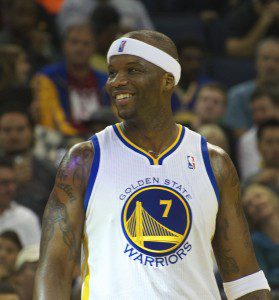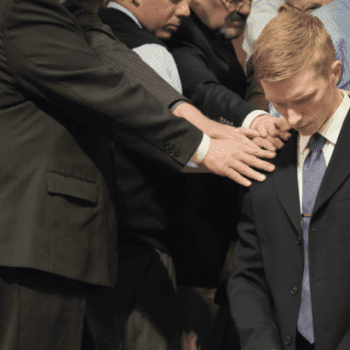 Every once in a while, you come across a story that, though not necessarily evangelical in nature, drives right to the heart of the truth. This recounting of basketball player Jermaine O’Neal’s work to be a good dad gets at the very core of fatherhood.
Every once in a while, you come across a story that, though not necessarily evangelical in nature, drives right to the heart of the truth. This recounting of basketball player Jermaine O’Neal’s work to be a good dad gets at the very core of fatherhood.
According to Chris Ballard of Sports Illustrated, O’Neal had a chance to play on the 2014-15 Golden State Warriors. He loved the team, but felt the pull to leave the game in order to be present for his family:
Still, O’Neal was torn. For years, he’d told his family he was going to put them first. O’Neal didn’t meet his father until his third season in the NBA, and then only briefly developed a relationship. Now, he was coaching his eight-year-old son’s basketball team. Asjia had recovered from open heart surgery and was a rising star in volleyball, a 6’3″ middle blocker. He worried about the impact of leaving. “Physically, I could have done it. Mentally, no. My son and my family asked me not to, and that was the trump card. At the time, my son was saying, ‘Hey Dad, I need you.’ That did something to me. I was seeing changes in my son, he became more angry. And for a guy who didn’t meet his dad until seven years ago myself, I understood what it meant not to have a dad there.”
Several months after he left, O’Neal watched the Warriors win a championship. He still felt torn, watching Stephen Curry, Klay Thompson, and his former teammates celebrate. He never won the trophy, and anyone who watches sports knows that after the hunger for individual accolades fades, the desire for a championship ring only increases. His daughter saw the difficulty he was in and reached out to him to thank him:
A few minutes later, O’Neal’s phone buzzed. She’d sent a text. In it, she wrote about how she was so happy that he was home and how much it meant to her that that he traveled and watched her play volleyball and was there for her brother and that, “Dad you being home is like you being a champion.” “It made me so emotional,” O’Neal says. “When she wrote the text, how much it meant to her, to get that, it cleared up everything. All the emotions I had, missing out on the championship. That did it and I knew right away that my time was over.”
Jermaine O’Neal is no perfect man, but I’m impressed by his example. He grew up without a dad but has become a selfless one. That’s remarkable. Your heart goes out to his daughter, who had open-heart surgery. What an incredible comfort it must have been to her to have her father there by her side in such a frightening episode. What a legacy O’Neal is leaving, showing his children that they matter more to him than his own accomplishments (major as they are on the court). For the rest of their lives, his family will be able to look back and say that he sacrificed his own interests for the good of his loved ones.
This is a powerful anecdote for us fathers to consider. We need to work and provide for our families. We want to free up our wives to care well for our children and homes (1 Tim. 5:14; Titus 2:5). We want to put the big, weighty responsibility of provision squarely on our shoulders, a responsibility that surely involves stresses, sometimes long hours, and even physical costs. Some men have to travel for their job, much as they want to be closer to home. We want to work hard, to labor well, to be ambitious for God as we honor him by our daily fulfillment of the dominion mandate (Gen. 1:26-27). All this and more the Bible enfranchises, and even holds out as a vital part of the good life.
But we shouldn’t make the mistake of thinking any sacrifice on behalf of financial provision and vocational fulfillment is worth it. It’s plainly not. Jermaine O’Neal got it right. He passed up the sweetest pleasure an athlete can experience, the goal you work toward over thousands of hours and multiple decades to achieve. He did so for one simple reason: to invest in the permanent things. To love his family. To be there for his children.
A fallen world and sinful nature exert pressure on us in many ways. One of the most profound effects of the fall is this: we feel a centrifugal force in our bones. We don’t know why, exactly; we simply know that we are pulled away from the most precious realities toward lesser things. This comes in too many forms to count, some bad, some neutral, some even good in nature:
The golf course. Or basketball court.
Hangout time with our buddies.
The morning appointment we feel we have to keep.
The ministry obligation we could turn down but don’t.
The new role–aside from our primary work responsibility–that scratches an itch.
The hobby that we’ve loved from boyhood and can’t seem to let go of.
Studying for a degree we don’t really need but really want.
The desire for “me time” in a life that includes very little letting off of steam.
The writing project that consumes us and does little to help the family.
The friends or family we want to see (leaving behind the family that depends on us).
Our failure to prioritize our family isn’t usually just a matter of poor time management (though this is a real issue for us sinners). Our failure is often connected to some identity issue. We feel we need something extra to give us worth, to show that we’re a major player, to stave off some voice from the past from decades ago that told us we’d never make it.
This obviously gets into much deeper theological-spiritual territory, but for now, here’s what we need to remember: Christ is our identity. He is our life (Colossians 3:4). We don’t need anything else to be whole, happy, and fulfilled. We don’t need to prove anything to anyone. We don’t need to be seen as a major player. We can die to our reputation, die to our selfish ambition, die to our unrealized goals, die to the things that tug at us and whisper, “You can always spend time with your kids later.”
We all have our own struggle. We all are tempted in our own unique ways to find our identity in something else besides Christ. Fathers need to remember who they are by the grace of God. We have nothing to prove. We are fools for Jesus (1 Cor. 4:10). We do not need a good reputation, a big image, an impressive brand. We need to die to ourselves, and live to God, and thus pour out every drop of our existence for his glory.
This means, for us dads, that we make the same choices that Jermaine O’Neal made. We turn down that which glitters for that which giggles. We guard the calendar and say no to many worthwhile opportunities so that we can say yes to eternal responsibilities. We frankly don’t spend as much time with friends and church members as we would like in order to spend our chronological capital greedily on our children.
And you know what? You make this kind of choice, you opt in to this kind of self-sacrificial life, and you will likely find yourself where O’Neal did: staring at those who, in worldly terms, have more than you do. Your neighbor may “win at life” more than you. You may not have a heavy championship ring to wear the rest of your days. You may not be able to reminisce about the times when you stood at the burning center of your field, your vocation, and helped make the decisions that settled history.
In that moment, you’ll feel the weight of what you gave up. You’ll feel discontent rattling in your bones. And then you’ll look down at smiling little faces. You’ll remember who you are in Christ, and what you are called to be as a father. You’ll think back not to shining public moments, but to quiet family times, times filled with happiness and bursting with meaning, and you’ll smile.
Then, you’ll know that it was all worth it–all the self-sacrifice, all the missed opportunities withe the world-changers, all the foregone fun with your buddies. Sooner than you know, a greater father than you, a perfect father, will take you by the hand, walk you into eternity, and you will see that none of it was in vain.
Your sacrifices have become your reward.
***************
To hear more about the shape and power of godly fatherhood, join me and John Piper, Alistair Begg, John MacArthur, Al Mohler, Lig Duncan, and many more speakers at the CBMW T4G pre-conference, “The Beauty of Complementarity,” on April 11-12, 2016, in Louisville, Kentucky. Tickets are on sale now, and registrants receive over $100 of excellent theological resources.
Image: “Jermaine O’Neal Smiling” by Noah Salzman, used with permission from Wikimedia Commons.











